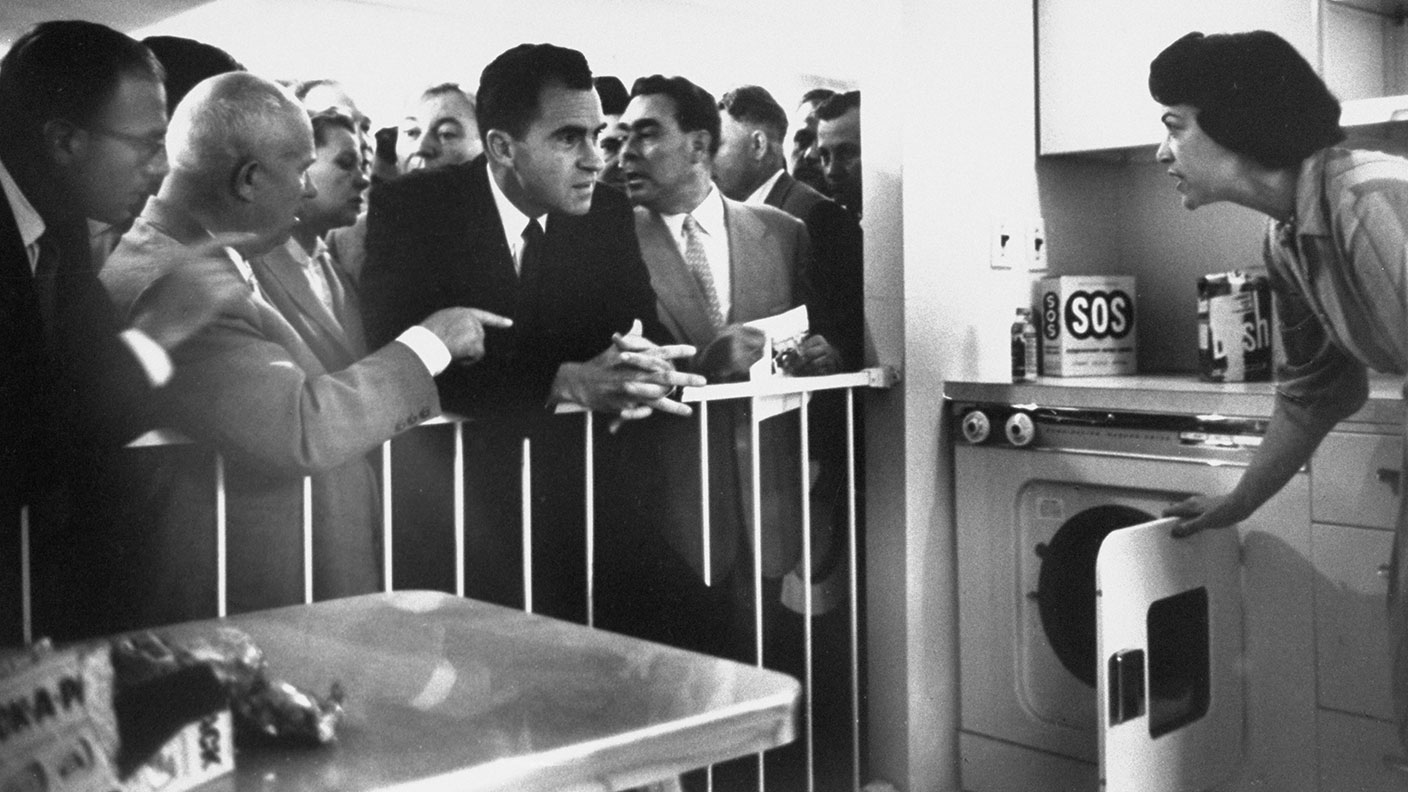24 July 1959: Nixon's 'Kitchen Debate' with Khrushchev
A typical American kitchen was the scene for a clash of words between Cold War superpowers the USA and the USSR on 24 July 1959.


Get the latest financial news, insights and expert analysis from our award-winning MoneyWeek team, to help you understand what really matters when it comes to your finances.
You are now subscribed
Your newsletter sign-up was successful
Want to add more newsletters?

Twice daily
MoneyWeek
Get the latest financial news, insights and expert analysis from our award-winning MoneyWeek team, to help you understand what really matters when it comes to your finances.

Four times a week
Look After My Bills
Sign up to our free money-saving newsletter, filled with the latest news and expert advice to help you find the best tips and deals for managing your bills. Start saving today!
What better place to have an argument than around the kitchen table? For many families, it is where lively debates boil over into angry feuds. It's fitting, then and more than a little surreal that the kitchen set the scene for a clash of words between the two Cold War superpowers: the USA and the USSR on 24 July 1959.
At the American National Exhibition in Moscow, US vice-president Richard Nixon was playing host to Soviet premier Nikita Khrushchev. The idea was to showcase American products, made in a free enterprise economy, to a Russian audience. Visitors could take a stroll through a typical' Californian house and marvel at all the cutting-edge gadgets on display, including a colour television.
Shortly before the exhibition, however, the United States Congress had passed a proclamation that called on its citizens to "pray" for the "people enslaved by the Soviet Union". That put the Russians in a bad mood.
MoneyWeek
Subscribe to MoneyWeek today and get your first six magazine issues absolutely FREE

Sign up to Money Morning
Don't miss the latest investment and personal finances news, market analysis, plus money-saving tips with our free twice-daily newsletter
Don't miss the latest investment and personal finances news, market analysis, plus money-saving tips with our free twice-daily newsletter
Walking through the house, Nixon stopped to draw his guest's attention to a built-in washing machine. "We have such things", Khrushchev snapped. Nixon replied that "Americans were interested in making life easier for their women". That is "the capitalist attitude toward women", Khrushchev shot back.
But the great thing, said Nixon, was that the house was so cheap, even a steelworker on $3 an hour could afford it. Khrushchev replied that Soviet "peasants" could afford it too. But unlike the Americans, they built their houses to last.
Under a veneer of fake smiles, the debate took a more sinister turn nuclear weapons. "Would it not be better to compete in the relative merits of washing machines than in the strength of rockets?" Nixon appealed. Accusing Nixon of hypocrisy, Khrushchev replied that it was America that was belligerent and that "in this respect, we can also show you something".
The frank nature of the exchange on their respective economies in front of the media made the Kitchen Debate' so remarkable, as was the agreement to broadcast their opposing views on each other's television services. As Khrushchev remarked, "even in an argument between friends, there must be sitting down around a table".
Get the latest financial news, insights and expert analysis from our award-winning MoneyWeek team, to help you understand what really matters when it comes to your finances.

-
 Should you buy an active ETF?
Should you buy an active ETF?ETFs are often mischaracterised as passive products, but they can be a convenient way to add active management to your portfolio
-
 Power up your pension before 5 April – easy ways to save before the tax year end
Power up your pension before 5 April – easy ways to save before the tax year endWith the end of the tax year looming, pension savers currently have a window to review and maximise what’s going into their retirement funds – we look at how
-
 31 August 1957: the Federation of Malaya declares independence from the UK
31 August 1957: the Federation of Malaya declares independence from the UKFeatures On this day in 1957, after ten years of preparation, the Federation of Malaya became an independent nation.
-
 13 April 1960: the first satellite navigation system is launched
13 April 1960: the first satellite navigation system is launchedFeatures On this day in 1960, Nasa sent the Transit 1B satellite into orbit to provide positioning for the US Navy’s fleet of Polaris ballistic missile submarines.
-
 9 April 1838: National Gallery opens in Trafalgar Square
9 April 1838: National Gallery opens in Trafalgar SquareFeatures On this day in 1838, William Wilkins’ new National Gallery building in Trafalgar Square opened to the public.
-
3 March 1962: British Antarctic Territory is created
Features On this day in 1962, Britain formed the British Antarctic Territory administered from the Falkland Islands.
-
10 March 2000: the dotcom bubble peaks
Features Tech mania fanned by the dawning of the internet age inflated the dotcom bubble to maximum extent, on this day in 2000.
-
9 March 1776: Adam Smith publishes 'The Wealth of Nations'
Features On this day in 1776, Adam Smith, the “father of modern economics”, published his hugely influential book The Wealth of Nations.
-
 8 March 1817: the New York Stock Exchange is formed
8 March 1817: the New York Stock Exchange is formedFeatures On this day in 1817, a group of brokers moved out of a New York coffee house to form what would become the biggest stock exchange in the world.
-
7 March 1969: Queen Elizabeth II officially opens the Victoria Line
Features On this day in 1969, Queen Elizabeth II took only her second trip on the tube to officially open the underground’s newest line – the Victoria Line.